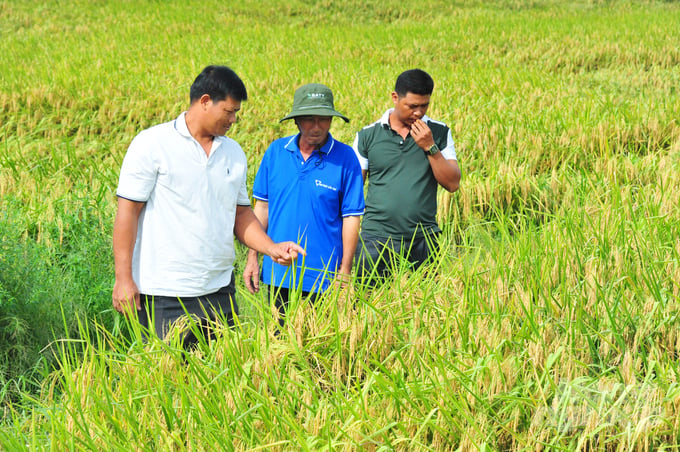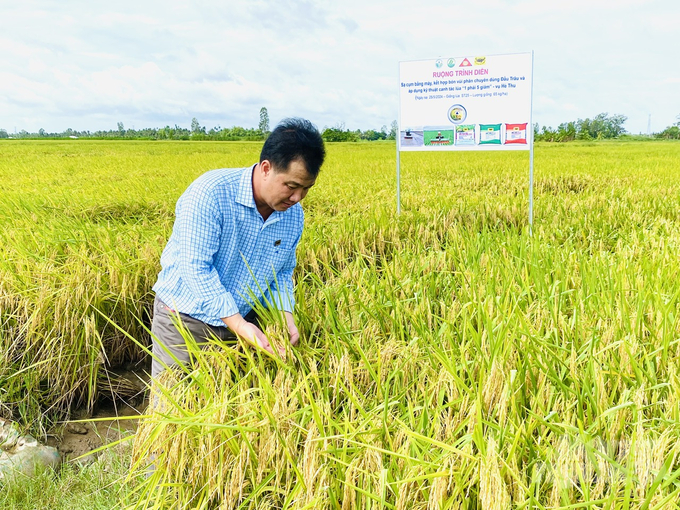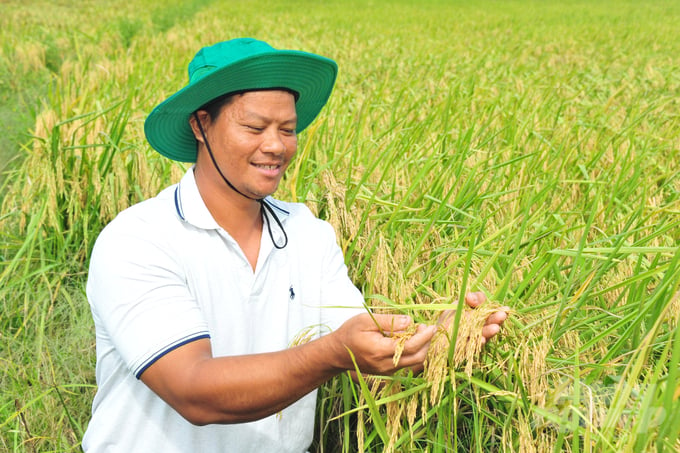December 30, 2025 | 14:58 GMT +7
December 30, 2025 | 14:58 GMT +7
Hotline: 0913.378.918
December 30, 2025 | 14:58 GMT +7
Hotline: 0913.378.918

The model "Smart Rice Cultivation with Emission Reduction in the Mekong Delta" during the summer-autumn crop of 2024 at Hung Loi Agricultural Cooperative (Long Duc Commune, Long Phu District, Soc Trang Province). Photo: Le Hoang Vu.
In the Summer-Autumn 2024 season, the Soc Trang Agricultural Extension Center, in collaboration with Binh Dien Fertilizer Joint Stock Company, Saigon Kim Hong Company, Bayer Vietnam, and Ong Tho Rice Joint Stock Company, implemented the "Smart Rice Farming and Emission Reduction in the Mekong Delta" model at Hung Loi Agricultural Cooperative (Long Duc commune, Long Phu district, Soc Trang) with a total area of 6 hectares and 9 participating households.
Mr. Truong Van Hung, Director of Hung Loi Agricultural Cooperative, expressed excitement, saying, "This is the first year our cooperative has participated in the smart rice farming and emission reduction model according to the technical process provided by the provincial agriculture department. We also receive support from fertilizer, pesticide companies, and clustered sowing machinery, and ultimately, the company guarantees the purchase of all products. Therefore, cooperative members are confident in their production."
The ST25 rice variety in the model is estimated to yield 6.5 tons/ha, with a selling price of 11,000 VND/kg. After deducting costs, the cooperative's model fields generate a profit of nearly 54 million VND/ha, approximately 6 million VND/ha higher than fields outside the model.
Mr. Vo Quoc Trung, a technical officer at the Soc Trang Agricultural Extension Center, stated that the model has delivered positive results. The average yield in the Summer-Autumn 2024 season was 6.5 tons/ha, which is 10-15% higher than traditional farming methods. This not only increases farmers' incomes but also reduces production costs by saving water and fertilizers.

Smart rice cultivation with emission reduction in the Mekong Delta helps farmers reduce costs and increase profits by 25 - 30% compared to traditional production. Photo: Le Hoang Vu.
In addition, thanks to the use of smart fertilizers and water management through the alternate wetting and drying (AWD) method, the model significantly reduced greenhouse gas emissions. Statistics show that emissions decreased by about 20-25% compared to traditional farming methods, contributing significantly to sustainable agricultural development.
The success of the model is also due to the key role of companies such as Binh Dien Fertilizer Joint Stock Company, Saigon Kim Hong Company, Bayer Vietnam, and Ong Tho Rice Joint Stock Company. These companies provided advanced products and farming solutions to the participating farmers.
Binh Dien Fertilizer Joint Stock Company introduced a line of smart fertilizers that offer stable nutrient supply, allowing the rice plants to absorb nutrients more efficiently while minimizing water evaporation. This not only helps the rice plants grow stronger but also reduces fertilizer waste, thereby minimizing environmental pollution.
Saigon Kim Hong Company, with its experience in producing and supplying agricultural equipment and technology, particularly cluster sewing machines, brought high efficiency. These scientific and technological advancements help farmers improve economic efficiency in agricultural production. The company’s role was to assist farmers in reducing seed usage, which not only lowered seed costs but also reduced pesticide and fertilizer expenses as healthier rice plants required less protection from pests and diseases.

The joy of farmers implementing the smart rice cultivation model when rice yields are high and production costs are reduced. Photo: Le Hoang Vu.
At the Hung Loi Agricultural Cooperative, Saigon Kim Hong Company's cluster sewing machine was provided free of charge for the model, using a formula of 65 kg of seed per hectare, reducing the seed usage by 2-3 times compared to the traditional sowing methods previously employed by farmers. The reduction in seed, fertilizers, and pesticides did not lower the rice yield for the farmers.
Additionally, Bayer Vietnam provided plant protection solutions, enabling farmers to effectively control pests without over-relying on pesticides. This not only mitigated negative impacts on human health but also preserved the environment.
Ong Tho Rice Joint Stock Company played a crucial role in ensuring the consumption of rice products from the smart cultivation model. By committing to purchase the products at stable prices, the company helped farmers feel secure in their production, while also enhancing the value of rice products in the Mekong Delta.
The smart, low-emission rice cultivation model at Hung Loi Agricultural Cooperative is a testament to the effectiveness of applying scientific and technological advancements in agricultural production. This approach not only boosts rice productivity but also minimizes environmental impacts, contributing to the sustainable development of the agriculture sector in the Mekong Delta.
"For Soc Trang province, with support from businesses and relevant agencies, this model promises to expand and spread in the future, contributing to the sustainable development of local agriculture," expressed Mr. Vo Quoc Trung from the Soc Trang Agricultural Extension Center.
Translated by Mai Quang Huy

(VAN) From extensive shrimp ponds, baskets of don gathered on the mudflats, to boats carrying visitors to watch birds, all livelihoods here depend on clean water, green forests, and the calls of migratory birds.
/2025/12/26/0703-3-204813_117.jpg)
(VAN) Transparency in information and listening to local people have helped address ground clearance bottlenecks and build social consensus, thereby accelerating the progress of the JICA3 irrigation project.
/2025/12/27/0609-3-233846_327.jpg)
(VAN) The JICA3 project is expected to become a 'water shield,' helping control saltwater intrusion, proactively secure water resources, protect livelihoods, and promote sustainable development in coastal areas.
/2025/12/26/5654-3-164509_655.jpg)
(VAN) As Viet Nam makes strong commitments toward achieving net-zero emissions, controlling and reducing methane emissions in livestock production is increasingly becoming a mandatory requirement.

(VAN) 'People, Primates, Plants: Co-managing Biodiversity and Improving Livelihoods in Vietnam' (the PPP Project) is an international initiative implemented in Vietnam by BGCI, CEGORN, and ICRAF/World Agroforestry.

(VAN) Dak Nong established a risk-level zoning map for coffee, built a digital data platform for the sector, and promoted certified production in line with EUDR.
/2025/12/25/2709-1-211551_295.jpg)
(VAN) In response to the U.S. Marine Mammal Protection Act (MMPA), Gia Lai province is implementing many solutions to protect marine mammals and develop sustainable, responsible fisheries.